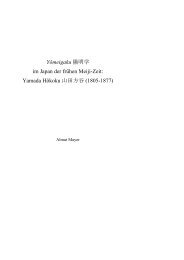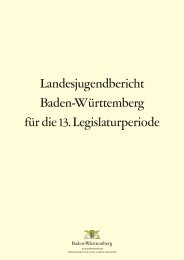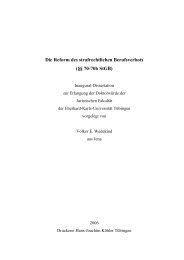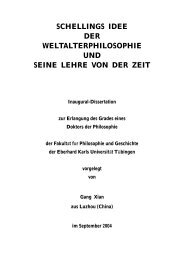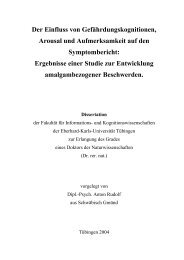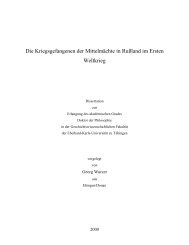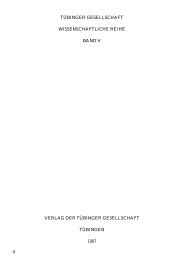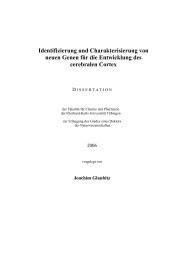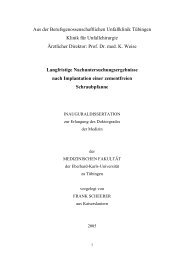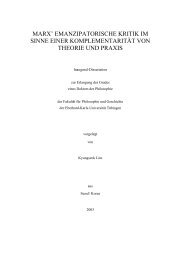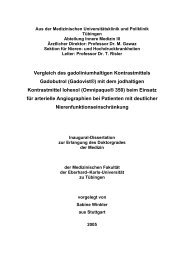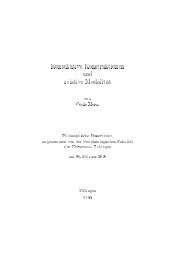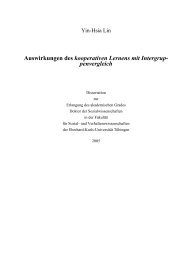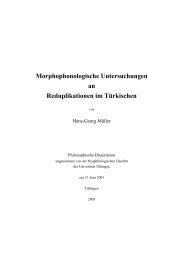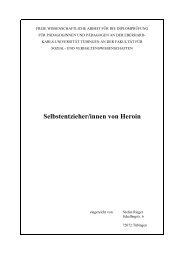Dekan: Prof. Dr. Martin Hautzinger - Universität Tübingen
Dekan: Prof. Dr. Martin Hautzinger - Universität Tübingen
Dekan: Prof. Dr. Martin Hautzinger - Universität Tübingen
Sie wollen auch ein ePaper? Erhöhen Sie die Reichweite Ihrer Titel.
YUMPU macht aus Druck-PDFs automatisch weboptimierte ePaper, die Google liebt.
Clemens Krause: Posthypnotische Amnesie für therapeutische Geschichten 205<br />
Fodor, J. A. (1985). Multiple review of the modularity of mind. Behavioral and Brain<br />
Sciences, 8, 1-42.<br />
Forster, K. I. & Davis, C. (1984). Repetition priming and frequency attenuation in lexical<br />
access. Journal of Experimental Psychology: Learning, memory, and Cognition, 10, 680-698.<br />
Fuld, P.A., Katzman, R., Davies, P. & Terry, R.D. (1982). Intrusions in a sign of<br />
Alzheimer’s dementia: chemical and pathological verfication. Annals of Neurology, 11, 155-<br />
159.<br />
Fuster, J.M. (1997). The prefrontal cortex: Anatomy, physiology, and neuropsychology of<br />
the frontal lobe, 3 rd ed. New York: Raven Press.<br />
Frankel, F.H. (1990). Hypnotizability and dissociation. American Journal of Psychiatry,<br />
147, 823-829.<br />
Frederiks, J.A.M. (1990). Transient global amnesia; an amnesiac TIA. In: Markowitsch,<br />
H.J. (Ed.), Transient global amnesia and related disorders (pp. 28-47). New York: Hogrefe &<br />
Huber.<br />
Frith, C. & Cahill, C. (1995). Memory following electroconvulsive therapy. In: Baddeley,<br />
A.D., Wilson, B.A. & Watts, F.N. (Eds.), Handbook of memory disorders (pp. 320-335). New<br />
York: John Wiley and Sons.<br />
Fromm, E. (2000). Interview mit Erika Fromm. Hypnose und Kognition, 17, 155-169.<br />
Gabert-Varga, U., Schmid, M. & Revenstorf, D. (1991). Einstreutechnik und<br />
therapeutische Anekdoten zur Behandlung akuter Schmerzen. Experimentelle und klinische<br />
Hypnose, 7, 109-146.<br />
Gallistel, R. (1995). Is long-term potentiation a plausible basis for memory? In: Mc Gaugh,<br />
J. L., Weinberger, G. & Lynch, G. (Eds.), Brain and memory: Modulation and mediation of<br />
plasticity (pp. 328-337). New York: Oxford University Press.<br />
Gardiner, J. M., Craik, F. I. M. & Birtwistle, J. (1972). Retrieval cues and release from<br />
proactive inhibition. Journal of Verbal Learning and Verbal Behavior, 11, 778-783.<br />
Gearan, P. & Kirsch, I. (1993). Response expectancy as a mediator of hypnotizability<br />
modification. International Journal of Clinical and Experimental Hypnosis, 41, 84-91.<br />
Gearan, P. Schoenberger, N.E. & Kirsch, I. (1995). Modifying hypnotizability: A New<br />
component analysis. International Journal of Clinical and Experimental Hypnosis, 43, 70-89.<br />
Geiselman, R.E., Bjork, R.A. & Fishman, D.L. (1983). Disrupted retrieval in directed<br />
forgetting: A link with posthypnotic amnesia. Journal of Experimental Psychology: General,<br />
112, 58-72.<br />
Geiselman, R.E., Fisher, R.P., MacKinnon, D.P. & Holland, H.L. (1986). Enhancement of<br />
eyewitness memory with the cognitive interview. American Journal of Psychology, 99, 385-<br />
401.<br />
Gerrig, R.J. & Prentice, D.A. (1991). The representation of fictional information.<br />
Psychological Science, 2, 336 – 340.<br />
Gheorghiu, V.A. (1973). Hypnose und Gedächtnis: Untersuchungen zur hypnotischen<br />
Hypermnesie und Amnesie. München: Goldmann.<br />
Gheoghiu, V.A. (1990). Beziehungen zwischen Suggestion und Hypnose. Experimentelle<br />
und klinische Hypnose, Kongreßsonderheft, 167-179.<br />
Gheorghiu, V.A. (1996). Die adaptive Funktion suggestionaler Phänomene: Zum<br />
Stellenwert suggestionsbedingter Einflüsse. Hypnose und Kognition, 13, 125-146.<br />
Gillund G. & Shiffrin, R.M. (1984). A retrieval model for both recognition and recall.<br />
Psychological Review, 91, 1-67.<br />
Glanzer, M. & Cunitz, A.R. (1966). Two storage mechanisms in free recall. Journal of<br />
Verbal Learning and Verbal Behavior, 5, 351-360.<br />
Gobet, F. & Simon, H.A. (1996). Recall of rapidly presented random chess positions is a<br />
function of skill. Psychonomic Bulletin and Review, 3, 159-163.



